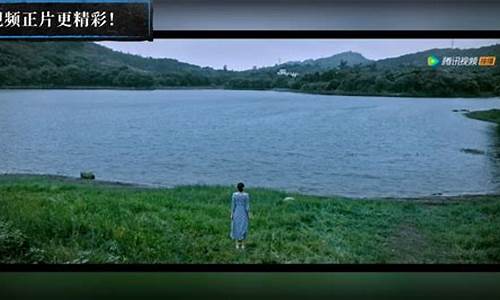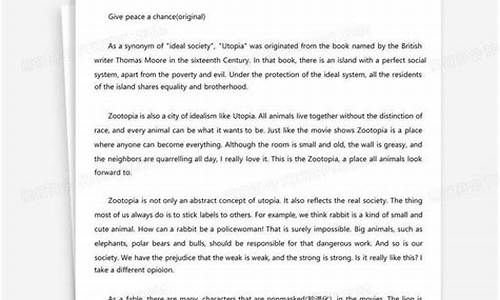通天塔电影内容简介_通天塔影评片段
1.通天塔影评(探索**世界的最佳指南)
2.美片《通天塔》里扮演日本哑女的女星是谁?
3.陆柱国作品
4.《狄仁杰之通天帝国》影评
5.通天塔英文影评

通天塔 英文对白
Let Yussef shoot
2
Dad, I want to shoot first
3
This is the safety.
Push it in when you're ready
4
If he doesn't hit the jackals. At least
he'll scare the shit out of them
5
Your tuen Yussef
6
He shoot better than you
7
Good luck, he a good day
8
God bless you
9
Kill at least three jackals
10
Make sure no one see you with
the rifle...
11
If you see someone corning, hide it
12
What are you doing?
13
I told you don't spy on her
14
What do you care?
15
Move it
16
Five to two
17
There's ajackal
18
Where?
19
Over there
20
What are you doing, you idoit?
21
Zohra doesn't mind
22
She doesn't, but I do
23
This is berween her and me
24
You're both pigs.
Next time I'm going to tell Dad
25
Stay out of this
26
If you want me to stay out of it,
don't do it
27
What are you doing?
28
Hassan said this bullet could reach
three kilometers
29
That rock didn't move
30
You don't know how to shoot.
Give me the rifle
31
See
32
Yeah, but that's not three kilometers
33
I bet the bullet can't hit that far
34
There bullerts are lame
35
You're not aiming right
36
What'll you gime me if I hit that car?
37
I'll shoot.
38
You se? Nothing
39
Let me shoot
40
Shoot at it
41
See... nothing
42
You're right, they're useless
43
Where are these kids?
44
Where are you?
45
I'm coming to get you...
46
You win
47
Thank you, I really reciate that
48
No, no. Dont worry. Sir, dont worry
49
Mike, your dad calling.
50
Daddy. How are you? Good
51
Dad, you guess what?
I did really good in the class
52
It held all over my hand. He bit me
53
Dad, are you ok?
54
Mike. Mike
55
Did you brush your teeth?
56
Sleep with angels, my darling
57
Sleep will, sweetie
58
Mia
59
Can you put the light on?
60
You are already sharing a room...
61
didn't we agree to sleep with the
light off?
62
I'm scare
63
There's nothing to be scared of
64
But i'm scare what hen gonna
hen to me
65
No, that won't hen to you
66
I'm die whn I was sleeping
67
I sit here with you, then you don't scare
anymore. Ok?
68
Today is my son wedding, Sir
69
Can anyone come to take care
of the kids?
70
Ltjust one day
71
I really counting on you, Amelia.
I'm sorry, but you he to do this
72
How can I be in two places at once?
73
I'm just asking you to take them
dor today
74
I can't the mister is still home
75
And they aren't going out?
76
No, I don't think so
77
Okat, I'll talk to you later
78
I can't Amelia
79
Please, it's my son wedding
80
Just for the day, Lucia. I'll be back for
them tonight
81
And what do I say to Mrs. Catherine?
82
I don't know.
Tell her they're your nephews
83
Right, because they look so much
like me...
84
with my Ameican looking face!
85
We are going to see your house?
86
You want to see my house?
Is that far?
87
No. No
88
What's up?
89
Hi, Auntie
90
Good to see you, Santiago
91
Mike. May. Hello
92
They're really shy
93
What? These kids are coming with us?
94
I couldn't find anyone to watch them
95
Their parents won't return tonight
96
Why bring them?
They'll drive you crazy
Dont worry, they're very good kids
98
Don't you want to lee them with
somebody?
99
I know a girl who can take care of them
100
Are you crazy?
I he to take them with me
101
I can't lee them with just anybody
102
Are you sure, Auntie?
103
I'll he the Chishiko
104
What you he food that not fat?
The Natang is delicious
105
I'll he the frying plate and black coco
106
Why you want to come here?
107
When we mine. Really?
108
Why are we here?
109
Throw the ice. The coke is hot
110
You dont know what kind of water
doesn't it live
111
This is impress. Why can you just relax?
Why you so stress?
112
You know the reason, I'm stress.
113
You could try
114
You don't think I try
115
You really forgive me?
116
You know what I'm talking about.
117
OK
118
Just let me know when you ready
to argue
119
What hen? You ok?
120
What hen?
121
Shut us down
122
Stop the bus
123
Stop the bus
124
The ball was out
125
That was out
126
No, it was good
127
That was out
128
I'm deaf, not blind
129
You shouldn't he lost your temper,
We lost the game
130
It wasn't my fault. It was the ref
131
If you hadn't been thrown out, we would've
won the game
132
Why are you in a bad mood?
133
She's alway in a bad mood because
nobody fucked her yet
134
I'm gonna fuck your dad to get rid
of my mood
135
I'll see you at the J-Pop
136
What do you want to eat?
137
I said I'd meet my friend from the
team at J-Pop
138
Didn't you tell me, we would he
lunch together?
139
Dad, I told you I was going to eat
with them
140
You never pay attention to me
141
My mother always paid attention to me
142
Why do you want to fight?
143
I miss your mother too
144
I'm doing the best I can
145
Don't forget the dentist at three
146
Take care
147
Do you he a table?
148
Why all the way in the conner?
149
Isn't the view nice?
150
Do you like him?
151
Hello
152
Hello
153
Can I play with you?
154
Or you can he a drink with us?
155
Tell him to speak slowly
156
Can you say that a little slower?
157
You assholes, how embarrasing
158
What's the matter?
159
They look at us like we're monsters
160
Oh, come off it
161
What are you doing?
162
Now they're going to meet the real
hairy monster
163
Don't fprget your ointment with
the dentist. Papa
164
I he to go
165
I'll see you at your place, then
166
What are you doing here?
167
Something we ate ge us a stomach ache
168
The goats will die if they, don't eat
169
Wash your face and take them out again
170
My stomach hurts
171
There are other chores to do then
172
Move it. Let's go
173
God bless. Bye, bye
174
Thank you, I'll see you tomorrow
175
Tell your mother to prepare dinner.
176
Did you kill any jackals?
177
We shot at them but didn't hit any
178
We he to kill them if not they're going
to eat all the goats
179
Why did you come home late?
180
They closed the road, we took the
long way
181
Apparently some terrorists killed an
American tourist
182
An American?
183
Yes, the terrorists attacked a tour bus
on the road
184
No, there aren't any terrorists here
185
You never know
186
How do you know the American died?
187
That's what they were saying.
The doctor are looking dor the culprits
188
This is Mexico?
189
Yes, this is Mexico
190
My mom told that Mexico is very
dangrious
191
Yeah... it's full of Mexicans
192
Don't talk like that
193
It's not true
194
How wonderful, you made it
195
You decide to bring them
196
Hey, what's up?
1
Oh son, look how handsome
198
You look like Julio Preciado
199
Forget Julio Preciado, he looks loke
Luis Miguel
200
These are the kids I take care of
201
Say hi to Luis
202
Lucio, come here
203
This is Mike and Debbie
204
Take them to play
205
Mom, I dont know how you did it, but it
zipped up perfectly
206
And it's been 15 years since I wore
this dress
207
You jen't changed a bit, Ma
208
Working dear, hard work... that's what
keeps you young
209
What are you guys laughing about?
210
Nothing Ma, nothing
211
I'll give buck to the first who catches
a chicken
212
Careful with the 'huevois'
213
Very good, Debbie got one
214
Debbie's the winner
215
Okay, now we need another five
216
So we he five chickens here
217
Okay, now who's going to help me?
218
You? Okay, come
219
Hold it tight, like this
220
Grab it right
221
Everyone backup... give me some room
222
See there any doctor
223
We need to send her to hospital
224
Is far away, about 2 hours
225
Is there any closer?
Yes, but it on the south
226
The bus will take us in a hour and half
227
Stop
228
I need your help, my wife is injured.
I need your help now
229
Hospital. Come here
230
What is on this way, the never start
shooting at us. Turn the bus around that way
231
He mercy, turn the bus around
232
Is there anyone attack her?
I take her to my town.
233
In there, there is a daughter
234
Ok. Ok
235
we got to call the ambulance.
I need to my embassy
236
I'll make the call
237
Can she help? Yes
238
Wait, wait
239
Tell her. She he to keep presure
right here
240
You cannot oid, do you understand?
241
Do you understand?
242
I will be right back. No dont lee me
243
I will be right back. I just make a call
244
How is your wife? Lts bad...
245
Where? Where do I take?
246
What do you know?
We got to get here as soon as posible
247
You cant lee us here
248
He keep me in the bus.
He drop us off and come back here
249
Please just wait. Let me took you there
250
I need your phone. I will pay
251
Listen,
252
We still... listen, it been an acident
253
She just been shot
254
She been shot
255
I dont know. I dont know.
She hit in the...
256
Listen. I need you to call the embassy
and tell them what hen
257
Where are you?
258
3 hour south...
259
Tazarine. T, A, Z, A, R, I, N, E
260
3 hour south west of Afod, it is in the
desert. It is a village
261
Listen, listen. This is urgent ok. Call the
embassy, they will help us
262
Easy...
263
The bullet didn't touch her spine
264
If she stays like this, she will
bleed to death
265
He say, she will be fine
266
Don't lie to me. You tell me what he say.
Tell me what he say!
267
Hospital
268
I know hospital, what can you do?
269
Is there anyhing we can do?
270
I he to stitch up the wound to stop
the bleeding
271
He say, he need to sew up the wound
272
Stitches of what?
273
What do you mean stitches?
274
And tell him her clicle is broken
275
He say she has a broken bone.
The hospital only can help
276
We he to hold her down
277
Wait. Wait...
278
We he to do this
279
No... dont let him. Listen to me
280
Hold her still
281
Here are the sterilized drill bits
282
You he cities in two molars
283
What are you doing?
284
What's wrong with you?
285
Get out
286
Get out right now
287
Yes. I'll let him know
288
That's Mr Wataya's daughter
289
Thank you
290
Are you Yasujiro Wataya's daughter?
291
She's deaf-mute...
292
Face her when you speak so she
can read your lips
293
Are you Yasujiro Wataya's daughter?
294
We are Yoshjo Hamano and Kenji Mamiya
of the Metropolitan Police
295
We would like to see your father
296
No, it's nothing bad.
We just want to talk to him
2
Do you know where he is?
298
Please tell him to call
299
Don't be scared.
We just want to talk to him
300
Thank you
301
Chieko, I waited for you. I he a meeting
so I'll be back late
302
I left you a bento box. Papa
303
I'm on my way to your place
304
Where are you?
305
Hurry up!
306
Moroccan officials are investigating
suspects...
307
in the shooting of an American tourist
308
Officials said the shooting took place...
309
Are you ready?
310
Yeah, I'm just going to get my bag
311
The cops come again?
312
Yeah. They hadn't caome in nine months.
But these were different cops
313
Did they come to ask about your
mother's death?
314
No, but they're probably going to ask my
dad about the same things
315
They're just not convinced, are they
316
Believe it or not, I liked the one
of the cops
317
Idiot
318
Did you put on panties?
319
And you sure it was here?
320
An American stooped me
321
I was scared. He was covered
in blood
322
Where was the bus stopped?
323
Over there
324
Captain Alarid... Captain Alarid
325
I found cartridges
326
We found four. Here's one
327
Did you search all over?
328
Yes, the whole mountain
329
They're from around here
330
Find out who has a 270 caliber rifle
331
Hassan lbrahim?
332
Yes
333
Drop your weapon
334
I don't he a weapon
335
Drop it now
336
I told you to drop your weapon
337
This is just my knife
338
Get on the ground
339
What did we do?
340
Get down on the ground... face down
341
Dont look at me
342
What did we do?
343
Take these skins to Najib, see if he
wants to buy them
344
Why did you shoot at the bus?
345
I didn't shoot at anyone
346
Then who?
347
It wasn't me
348
That was your rifle
349
I sold it yesterday
350
Who did you sell it to?
351
Do you know where Abdullah
Adboum lives?
352
Yes
353
You he to go over those mountains
354
Who lives in this area?
355
We live here with our mother.
Abdullah lives on the other side
356
If you're lying, I'm going to come back
and cut your balls off
357
You can come back anytime you like
358
Don't walk between the gres
359
Papa... Papa...
360
What hened?
361
The police... they're looking for you
362
Me? Why?
363
No, not for you... They're looking for us
364
Looking for you? Why?
365
Because of the tourist
366
What tourist?
367
The American... Yussef killed her
368
Liar, we both did
369
What are you saying?
370
Yussef started shooting at the cars...
371
because Hassan said that the bullet
could go far
372
Liar, you started shooting at the cars
373
But you killed her
374
What are you saying?
375
Yessef killed the American and he
spies on Zohra naked...
376
and Zohra lets him watch her
377
That's garbage
378
It's not garbage.
She's a street girl and he spies on her
379
Time to drink!
380
This song is dedicated from Luis
to Patricia...
381
the most beautiful bride on the world
382
I think Aunt Amelia has to dance
383
Amelia, can I he this dance?
384
I don't think your wife would like that
385
Ohh, she passed away 10 years ago.
Come on Amelia
386
Let's go dance... You he something
while on your face
387
Don't get excited, it's only cake
388
Today, near Tazarine there was
an incident
389
An American was shot
390
Authorities say it could he been a
robbery
391
But, the American was quick
to suggest a terrorist link
392
Minister Hassan Hazaf has said...
393
that terrorist cells he neem eradicated
in out country...
394
and one act to culgar banditry...
395
followed by seperficial evaluations the
US places upon it...
396
cannot ruin our image or the economy
3
I dont want to talk to you again
398
I want talk to the kid
399
I want talk to them
400
You he to turn on the air-conditioning,
my husband is ill
401
No air-conditioning, no gasaline
near. I'm sorry
402
Please, it's too hot.
We can get dehydrated
403
He say we can't turn on the air-condition
because it use the gas
404
Fuck that
405
We are leing soon
406
Just remember we almost find it. This woman
need to get back to town to get medication
407
Well, let him come in
408
...he will be here any minutes
409
I'm asking you all, please wait
410
30 minutes. I'm giving you 30 minutes
通天塔英文影评 Babel is my film of the year, and probably the best film I've seen in quite a few years. The film looks at relationships, from husband/wife, parent/children, brother/sister and plays around the themes of love in adversity. The characters are all interlinked in a very random way, it's a little like 10 degrees of separation. The film is set in Morocco, Mexico, Japan and the US, and the director makes full use of the different backdrops to bring the picture alive. The characters are deep and insightful, each has a problem to face up to and the sule, naturalistic way their issues play out make for truly emotional cinema. This is not a film about heroes, it's a film about trying to make the right choices when your back is to the wall, and the dous that go with this. Great movie, especially if you're a parent as your protective instincts will kick in at least once during this movie!
://.imdb/title/tt0449467/
通天塔影评(探索**世界的最佳指南)
通天塔:巴别塔(也译作巴贝尔塔),据《圣经》创世记第11章记载,是当时人类联合起来兴建,希望能通往天堂的高塔。为了阻止人类的,上帝让人类说不同的语言,使人类相互之间不能沟通,因此失败,人类自此各散东西。
**用六个家庭,十个人物,三个国家,四种语言,阐述了沟通和交流中的障碍给人们生活带来的问题。
美片《通天塔》里扮演日本哑女的女星是谁?
**是一种能够带给我们无尽想象和情感体验的艺术形式。每当我们踏入**院,我们都准备好进入一个全新的世界,与角色一同经历冒险、感受爱情、探索未知。然而,在**的海洋中,我们有时会迷失方向,不知道如何选择适合自己的**。的是,通天塔影评为我们提供了一个完美的指南,帮助我们探索**世界。
通天塔影评的背景
通天塔影评成立于2005年,是一个致力于为观众提供优质**推荐和影评的网站。通过多年的发展,通天塔影评已经成为了**爱好者们的必备工具。无论你是一个**新手还是一个资深影迷,通天塔影评都能够满足你的需求,并帮助你发现更多精彩的**作品。
如何使用通天塔影评
使用通天塔影评非常简单,只需按照以下步骤进行:
步骤一:访问通天塔影评网站
首先,打开你的浏览器,输入“.tongtianta”进入通天塔影评的官方网站。网站的界面简洁明了,非常易于使用。
步骤二:浏览**分类
通天塔影评网站提供了多种**分类,包括动作、爱情、科幻、恐怖等等。根据自己的兴趣,点击相应的分类,浏览该分类下的**推荐。
步骤三:阅读影评
每一部**都有一篇详细的影评,通天塔影评的影评非常全面,包括剧情介绍、演员表演、导演风格等等。阅读影评可以帮助你更好地了解**的内容和质量,从而做出更明智的选择。
步骤四:选择适合的**
根据自己的喜好和通天塔影评的推荐,选择一部适合自己的**。你可以根据影评的评分、观众的评价以及自己的兴趣来做出决定。
步骤五:享受**之旅
一旦你选择了一部**,就可以开始享受**之旅了。找个舒适的位置,打开电视或者去**院,让自己沉浸在**的世界中,感受其中的情感和故事。
通天塔影评的优势
通天塔影评之所以成为探索**世界的最佳指南,主要有以下几个优势:
优势一:专业的影评
通天塔影评的影评师团队由一群资深的**评论家组成,他们对**有着深入的研究和理解。他们的影评不仅包含对**的评价,还能够帮助观众更好地理解**的内涵和艺术价值。
优势二:全面的**推荐
通天塔影评涵盖了各种类型的**推荐,无论你喜欢什么类型的**,都能够在通天塔影评中找到适合自己的作品。无论是动作片、爱情片、科幻片还是恐怖片,通天塔影评都能够给出专业的推荐。
优势三:用户评价和互动
通天塔影评不仅提供了专业的影评,还允许用户对**进行评价和评论。这样的互动机制可以帮助观众更好地了解**的口碑和评价,从而做出更明智的选择。
陆柱国作品
女,生于1981年1月6日,日本神奈川县
星座:魔羯座
身高:169厘米
作为奥斯卡的大热门,**《通天塔》在美国上映后好评不断。菊地凛子在**中饰演的聋哑高校女学生知惠子因目睹母亲自杀、加上天生残障备受歧视、和父亲长期疏离等因素,压抑着许多悲苦和不满的复杂情绪,她多层次的演技表现,极具爆发力,获得许多影评人赞赏,权威的美国综艺周报《Variety》更赞誉她是今年最受瞩目的十大演员之一。
《狄仁杰之通天帝国》影评
陆柱国作品有《上甘岭》、《决斗》、《最后一个冬天》、《战火中的青春》、《独立大队》、《闪闪的红星》、《西南凯歌》、《道是无情胜有情》、《通天塔》、《大进军:席卷大西南》、《太行山上》。
1950年,创作个人首部《决斗》。1953年,出版长篇《上甘岭》。1957年,与毛烽合作编写了**剧本《最后一个冬天》,该剧本获得中国文化部**文学剧本创作三等奖。1959年,由其担任编剧的战争**《战火中的青春》上映。1964年,担任剧情**《独立大队》的编剧。14年,担任剧情**《闪闪的红星》的编剧。
17年,创作的**文学剧本《西南凯歌》获得第1届“夏衍文学奖”一等奖。1983年,由其担任编剧的剧情**《道是无情胜有情》上映。1986年,担任剧情**《通天塔》的编剧。19年,凭借战争**《大进军:席卷大西南》获得第8届上海影评人奖最佳编剧奖、第18届中国**金鸡奖最佳编剧奖。
2005年,凭借战争**《太行山上》获得第12届中国**华表奖优秀编剧奖。2007年,陆柱国获得第26届中国**金鸡奖终身成就奖。
余华简介
余华,1960年4月3日生于浙江杭州,浙江省嘉兴市海盐县人,中国当代作家,中国作家协会委员会委员。18年,高考落榜后进入卫生院当牙科医生。1983年,发表首部短篇《第一宿舍》。
1987年,发表《十八岁出门远行》、《四月三日》、《一九八六年》等短篇,确立了先锋作家的地位。同年,赴北京鲁迅文学院进修。1990年,首部长篇《在细雨中呼喊》出版。1992年,出版长篇《活着》。1995年,创作的长篇《许三观卖血记》在《收获》杂志发表。1998年,凭借《活着》获得意大利文学最高奖—格林扎纳·卡佛文学奖。
以上内容参考:百度百科—陆柱国
通天塔英文影评
狄仁杰之通天帝国》故事层层展开,剥丝抽茧,引人入胜,完全可以用缜密来形容。**画面优美,节奏明快,动作设计创新精,却充满浪漫的美丽诗意,是徐克近年最佳作品之一。《通天帝国》打开了视野,神秘诡秘的题材、大气磅礴的神都景象、精彩纷呈的动作场面,开创中国古装大片新局面。片中的怪力乱神,奇幻元素让人大开眼界,鬼市一段让人瞠目结舌,傀儡现身,诡异程度前所未见,裴东来与上官静儿双斧软鞭面对傀儡妖力几乎自相残杀一段,相当炫目。最好看的情节是上官静儿试探狄仁杰那一段。最让人心酸的情节是裴东来的悲惨结局。最刺激的情节是鬼市追逃一段。最大气磅礴的镜头是通天浮屠倒塌一幕。故事越到后面越精彩,结局合理,画面视野辽阔,色彩丰富,视觉效果刺激。
《狄仁杰之通天帝国》的侧重点既不是历史也不是武侠,而是悬疑。何况狄仁杰本就是中国古代的一名神探。即为神探,又是侦破自焚疑案,抽丝剥茧的分析自然少不了。在狄仁杰的侦破过程中存在着较多的暗线。自焚真相揭露并不很难(尽管其科学性值得质疑),但辨析幕后的凶手却颇为费解:心怀篡位野心的王爷?神出鬼没以鹿代言的国师?还是为达目的不择手段的武则天自己的烟雾弹?何况还有一个到底是谁想让狄仁杰死的问题。**中的三个分叉交待确实在某种程度上制造了强烈的悬疑色彩。整体上的叙事能够把握住了悬疑侦破片的节奏,结合紧张的打斗场面,让侦破过程显得惊心动魄。在案情本身的推理逻辑上,**中几个前后呼应的情节也点得相当精彩,其中包括上官静儿的易容术以及通天浮屠内含的惊天阴谋。导演打造出扣人心弦的悬疑气氛,配合步步为营的剧情发展,随处埋下伏笔布下暗线,致使影片疑窦丛生,从头至尾都弥漫着浓重的诡异气息,颇给人以惊悚片的观感。
《狄仁杰之通天帝国》把故事野史化和魔幻化。魔幻景观是其的一大卖点。服装上,徐克依然追求敦煌式的风格,让人物有复古和飘逸的感觉。李冰冰、刘德华等演员身上的服装打斗起来给人以极佳的视觉延伸。影片布景也竭力追求一种真实感。从马鞍上的图案到通天塔里的咒符,都给人以复古的真实感。作为影片重要道具的武则天通天像也蔚为壮观。在特效的映衬下,巨像内外都给人以大气磅礴的感觉。**手法上,徐克也引入了不少舶来品。影片开场后,武则天与狄仁杰在校场笑里藏刀的对话配合比武场面,以及古都的场面都是在向雷德利·斯科特的《角斗士》致敬。鬼市的场面,以及汪驴变脸是在向《哈利·波特》致敬。而随后船上冒险则借鉴了《加勒比海盗》的不少精华。竹林里的行刺场面则借鉴了《十面埋伏》。徐克并未简单抄袭模仿,而是将这些元素融入影片,学为己用。
其实只去这儿就好了 ://.imdb/title/tt0449467/externalreviews
://film.guardian.co.uk/News_Story/Critic_Review/Observer_Film_of_the_week/0,,1995118,00.html
Babel
Philip French
Sunday January 21, 2007
The Observer
Babel
(143 mins, 15)
Directed by Alejandro Gonzalez Inarritu; starring Brad Pitt, Cate Blanchett, Adriana Barraza, Gael Garcia Bernal, Rinko Kikuchi, Koji Yakusho
The Tower of Babel, iconically painted by Pieter Brueghel the Elder in the 16th century, forgettably re-created by John Huston in his film The Bible, is - as recorded in the first nine verses of Genesis, Chapter XI - one of the founding myths of Judaeo-Christian civilisation. It's a brutal tale of God's anger over the hubris of a united humanity's attempt to build a tower whose top might reach heen. To punish His own creations, He scattered them to the four corners of the earth and 'confounded their language, that they may not understand each other's speech'. During the first third of the 20th century the silent cinema went some way towards the forging of a universal, unifying art which was destroyed by the coming of sound. So the film Babel, which concerns itself with what divides and unites mankind, unfolds in four languages - English, Spanish, Arabic and Japanese.
The Mexican director Alejandro Gonzalez Inarritu and his scriptwriter Guillermo Arriaga are noted for the multiple overling stories of their previous collaborations, Amores perros and 21 Grams (a technique Arriaga was also to employ in The Three Burials of Melquiades Estrada). In Babel they link three continents and four families. Their theme is a variation on the so-called butterfly effect by which everything in the world is mysteriously, or scientifically, linked. Thus an insect fluttering its wings in the Amazon Basin can initiate a chain of events that ends in a hurricane in the Indian Ocean.
Here, a gun fired more or less at random with no purpose other than to test how far a bullet might go has consequences in Morocco, the United States, Mexico and Japan. The weapon is an American .270 Winchester hunting rifle that has gone from the States to Japan then come into the hands of an elderly Arab in a remote corner of southern Morocco. A neighbour buys the gun to kill jackals threatening his goats. While out tending the family herd, his young sons take pot shots, one of them at a distant tourist bus in the valley below them, not expecting to hit anything. But an American woman is seriously wounded and the repercussions are profound.
Last year, Andrew Niccol's film about the arms trade, Lord of War, began with a brilliant opening sequence that follows a bullet from a Russian factory as it passes through various hands until it blows a hole between the eyes of a child in Africa. Babel, however, is not, I think, trying to make yet another assault on gun culture and the armaments industry. The aim is to show what unites people through their natures and aspirations and what divides them through class, culture, politics, the global economy and the terrible gap in communication.
The American victim of the gunshot wound is Susan (Cate Blanchett), trelling in Morocco with her husband Richard (Brad Pitt). They're an affluent, good-looking, middle-class couple who left their two small children in San Diego to make this journey into the Sahara. The desert reflects their spiritual emptiness and they inevitably remind us of Port and Kit Moresby in Paul Bowles's The Sheltering Sky who are similarly exposed to life and death in North Africa. Their children are in the capable hands of a loyal, middle-aged Mexican maid, Amelia (Adriana Barraza), who, unable to find someone else to care for them, takes them with her to a family wedding south of the border. Meanwhile, seemingly unconnected to the two other strands, a widowed Japanese businessman is hing trouble with his rebellious daughter Chieko (Rinko Kikuchi), an attractive deaf-mute schoolgirl troubled by her burgeoning womanhood. It turns out that the link resides in a generous (but tainted) gift to a guide at the end of a hunting expedition.
The film unfolds, non-chronologically, in some 24 chapters, and we are left, as with a number of recent movies, to compose the narrative in our heads. For instance, the second chapter has the Hispanic maid receive news on the phone of the events in Morocco, but this is before we he even seen Brad Pitt and Cate Blanchett. It isn't until the penultimate chapter that we're present in Casablanca to see Pitt make the call home.
Taking in this cleverly contrived story, we steadily become aware of the shared neglect, innocence and playfulness of the two Moroccan boys, the girl in Tokyo and the pre-agers in San Diego. Moreover, while the movie seems to be sending out an ecumenically bland message about us all being part of mankind, and not sending to ask for whom the bell tolls, it is evident that some men's deaths are more significant than others, and indeed that America is the bell-ringer. The immediate assumption is that the bullet has been fired by a terrorist, and the European tourists panic and flee. A crisis is created, worldwide interest aroused. But whereas, partly by nature, partly by social deference, the authorities are courteous and helpful in their treatment of middle-class citizens, the peasants in Morocco are brutally ill-treated by their own police, and the Mexicans at the US border are viewed with contempt and suspicion.
The global village depicted in Babel is a harsh, unfair place. Tourism and mass media he done little to improve mutual respect and understanding. The film does not state this directly, but it dramatises it in a powerful and moving fashion. The task of re-creating that human unity God destroyed when the Tower of Babel was being built is probably too great, or has been too long neglected. Some will think this film glib and overly schematic. I found it an impressive, beautifully acted work with a tragic sense of life. The formality of its structure controls a seething anger.
://movies2.nytimes/2006/10/27/movies/27babe.html
Emotion Needs No Translation
The biblical story of Babel takes up a handful of verses in the 11th chapter of Genesis, and it illustrates, among other things, the terrible consequences of unchecked ambition. As punishment for trying to build a tower that would reach the heens, the human race was scattered over the face of the earth in a state of confusion — divided, dislocated and unable to communicate. More or less as we find ourselves today.
To make sense of this condition requires an ambition nearly as great as the one that got those ancient architects into trouble in the first place. Any discussion of “Babel,” therefore — whether grounded in skepticism or lost in admiration — has to begin by acknowledging just how much the film, the third collaboration between the director Alejandro González I?árritu and the screenwriter Guillermo Arriaga, sets out to do.
It tells four distinct stories, disclosing bit by bit the chronology and causality that link them and making much of the linguistic, cultural and geographical distances among the characters. The movie trels — often by means of jarringly abrupt cuts and shifts of tone — from the barren mountains of Morocco, where the dominant sound is howling wind, to fluorescent Tokyo, where the natural world has been almost entirely supplanted by a technological environment, to the anxious border between the United States and Mexico. Each place has its own aural and visual palette. The languages used by the astonishingly diverse cast include Spanish, Berber, Japanese, sign language and English. The misunderstandings multiply accordingly, though they tend to be most acute between husbands and wives or parents and children, rather than between strangers.
Surely, something must hold this world — or, at any rate, this film’s vision of the world — together. Whether anything does is the question most likely to fuel the cafe-table arguments “Babel” will surely provoke. The individual scenes are sometimes so powerful, and put together with such care and conviction, that you might lee the theater feeling dazed, even traumatized. “Babel” is certainly an experience. But is it a meaningful experience? That the film possesses unusual aesthetic force strikes me as undeniable, but its power does not seem to be tethered to any coherent idea or narrative logic. You can feel it without ever quite believing it.
But let’s give feeling its due. The sheer reckless ardor of Mr. González I?árritu’s filmmaking — the voracious close-ups, the sweeping landscape shots, the swiveling, hurtling camera movements — suggests a virtually limitless confidence in the power of the medium to make connections out of arent discontinuities. His faith in cinema as a universal language could hardly be more evident.
Some of the pieces of “Babel” are attached to one another by the banal lingua franca of television images, as events in North Africa, for instance, make the evening news in Tokyo. But Mr. González I?árritu’s own visual grammar tries to go deeper, to suggest a common idiom of emotion present in certain immediately recognizable gestures and expressions. We may not be able to read minds or decipher words, he suggests, but we can surely decode faces, especially when we see them at close range and in distress. Loss, fear, pain, anguish — none of these emotions, it seems, are likely to be lost in translation.
It gives nothing away to note that every story in “Babel” ends in tears. The raw, naturalistic intimacy of Rodrigo Prieto’s cinematography disguises some flagrant melodrama, as does the dedication of the actors, some of whom he never eared on film before.
The most glamorous cast members are Brad Pitt and Cate Blanchett, who play an American couple on a desultory vacation in Morocco, trying to repair the damage done to their marriage by the death of their infant son. Their movie-star charisma is turned down to a low, flickering flame, and the easy sense of entitlement they sometimes betray belongs naturally to their characters, Susan and Richard, who nonetheless receive a brutal reminder that even the privileged are vulnerable to accident.
Susan — the kind of tourist who worries that the local ice cubes carry disease — is badly wounded when a bullet is fired through a bus window, hitting her in the neck. The bullet comes from a gun belonging to Abdullah (Mustapha Rachidi), a goatherd, and used by his two sons, Ahmed (Said Tarchani) and Yussef (Boubker Ait El Caid), to keep jackals away from the herd.
To make sense of this condition requires an ambition nearly as great as the one that got those ancient architects into trouble in the first place. Any discussion of “Babel,” therefore — whether grounded in skepticism or lost in admiration — has to begin by acknowledging just how much the film, the third collaboration between the director Alejandro González I?árritu and the screenwriter Guillermo Arriaga, sets out to do.
It tells four distinct stories, disclosing bit by bit the chronology and causality that link them and making much of the linguistic, cultural and geographical distances among the characters. The movie trels — often by means of jarringly abrupt cuts and shifts of tone — from the barren mountains of Morocco, where the dominant sound is howling wind, to fluorescent Tokyo, where the natural world has been almost entirely supplanted by a technological environment, to the anxious border between the United States and Mexico. Each place has its own aural and visual palette. The languages used by the astonishingly diverse cast include Spanish, Berber, Japanese, sign language and English. The misunderstandings multiply accordingly, though they tend to be most acute between husbands and wives or parents and children, rather than between strangers.
Surely, something must hold this world — or, at any rate, this film’s vision of the world — together. Whether anything does is the question most likely to fuel the cafe-table arguments “Babel” will surely provoke. The individual scenes are sometimes so powerful, and put together with such care and conviction, that you might lee the theater feeling dazed, even traumatized. “Babel” is certainly an experience. But is it a meaningful experience? That the film possesses unusual aesthetic force strikes me as undeniable, but its power does not seem to be tethered to any coherent idea or narrative logic. You can feel it without ever quite believing it.
But let’s give feeling its due. The sheer reckless ardor of Mr. González I?árritu’s filmmaking — the voracious close-ups, the sweeping landscape shots, the swiveling, hurtling camera movements — suggests a virtually limitless confidence in the power of the medium to make connections out of arent discontinuities. His faith in cinema as a universal language could hardly be more evident.
Some of the pieces of “Babel” are attached to one another by the banal lingua franca of television images, as events in North Africa, for instance, make the evening news in Tokyo. But Mr. González I?árritu’s own visual grammar tries to go deeper, to suggest a common idiom of emotion present in certain immediately recognizable gestures and expressions. We may not be able to read minds or decipher words, he suggests, but we can surely decode faces, especially when we see them at close range and in distress. Loss, fear, pain, anguish — none of these emotions, it seems, are likely to be lost in translation.
It gives nothing away to note that every story in “Babel” ends in tears. The raw, naturalistic intimacy of Rodrigo Prieto’s cinematography disguises some flagrant melodrama, as does the dedication of the actors, some of whom he never eared on film before.
The most glamorous cast members are Brad Pitt and Cate Blanchett, who play an American couple on a desultory vacation in Morocco, trying to repair the damage done to their marriage by the death of their infant son. Their movie-star charisma is turned down to a low, flickering flame, and the easy sense of entitlement they sometimes betray belongs naturally to their characters, Susan and Richard, who nonetheless receive a brutal reminder that even the privileged are vulnerable to accident.
Susan — the kind of tourist who worries that the local ice cubes carry disease — is badly wounded when a bullet is fired through a bus window, hitting her in the neck. The bullet comes from a gun belonging to Abdullah (Mustapha Rachidi), a goatherd, and used by his two sons, Ahmed (Said Tarchani) and Yussef (Boubker Ait El Caid), to keep jackals away from the herd.
To make sense of this condition requires an ambition nearly as great as the one that got those ancient architects into trouble in the first place. Any discussion of “Babel,” therefore — whether grounded in skepticism or lost in admiration — has to begin by acknowledging just how much the film, the third collaboration between the director Alejandro González I?árritu and the screenwriter Guillermo Arriaga, sets out to do.
It tells four distinct stories, disclosing bit by bit the chronology and causality that link them and making much of the linguistic, cultural and geographical distances among the characters. The movie trels — often by means of jarringly abrupt cuts and shifts of tone — from the barren mountains of Morocco, where the dominant sound is howling wind, to fluorescent Tokyo, where the natural world has been almost entirely supplanted by a technological environment, to the anxious border between the United States and Mexico. Each place has its own aural and visual palette. The languages used by the astonishingly diverse cast include Spanish, Berber, Japanese, sign language and English. The misunderstandings multiply accordingly, though they tend to be most acute between husbands and wives or parents and children, rather than between strangers.
Surely, something must hold this world — or, at any rate, this film’s vision of the world — together. Whether anything does is the question most likely to fuel the cafe-table arguments “Babel” will surely provoke. The individual scenes are sometimes so powerful, and put together with such care and conviction, that you might lee the theater feeling dazed, even traumatized. “Babel” is certainly an experience. But is it a meaningful experience? That the film possesses unusual aesthetic force strikes me as undeniable, but its power does not seem to be tethered to any coherent idea or narrative logic. You can feel it without ever quite believing it.
But let’s give feeling its due. The sheer reckless ardor of Mr. González I?árritu’s filmmaking — the voracious close-ups, the sweeping landscape shots, the swiveling, hurtling camera movements — suggests a virtually limitless confidence in the power of the medium to make connections out of arent discontinuities. His faith in cinema as a universal language could hardly be more evident.
Some of the pieces of “Babel” are attached to one another by the banal lingua franca of television images, as events in North Africa, for instance, make the evening news in Tokyo. But Mr. González I?árritu’s own visual grammar tries to go deeper, to suggest a common idiom of emotion present in certain immediately recognizable gestures and expressions. We may not be able to read minds or decipher words, he suggests, but we can surely decode faces, especially when we see them at close range and in distress. Loss, fear, pain, anguish — none of these emotions, it seems, are likely to be lost in translation.
It gives nothing away to note that every story in “Babel” ends in tears. The raw, naturalistic intimacy of Rodrigo Prieto’s cinematography disguises some flagrant melodrama, as does the dedication of the actors, some of whom he never eared on film before.
The most glamorous cast members are Brad Pitt and Cate Blanchett, who play an American couple on a desultory vacation in Morocco, trying to repair the damage done to their marriage by the death of their infant son. Their movie-star charisma is turned down to a low, flickering flame, and the easy sense of entitlement they sometimes betray belongs naturally to their characters, Susan and Richard, who nonetheless receive a brutal reminder that even the privileged are vulnerable to accident.
Susan — the kind of tourist who worries that the local ice cubes carry disease — is badly wounded when a bullet is fired through a bus window, hitting her in the neck. The bullet comes from a gun belonging to Abdullah (Mustapha Rachidi), a goatherd, and used by his two sons, Ahmed (Said Tarchani) and Yussef (Boubker Ait El Caid), to keep jackals away from the herd.
To make sense of this condition requires an ambition nearly as great as the one that got those ancient architects into trouble in the first place. Any discussion of “Babel,” therefore — whether grounded in skepticism or lost in admiration — has to begin by acknowledging just how much the film, the third collaboration between the director Alejandro González I?árritu and the screenwriter Guillermo Arriaga, sets out to do.
It tells four distinct stories, disclosing bit by bit the chronology and causality that link them and making much of the linguistic, cultural and geographical distances among the characters. The movie trels — often by means of jarringly abrupt cuts and shifts of tone — from the barren mountains of Morocco, where the dominant sound is howling wind, to fluorescent Tokyo, where the natural world has been almost entirely supplanted by a technological environment,
声明:本站所有文章资源内容,如无特殊说明或标注,均为采集网络资源。如若本站内容侵犯了原著者的合法权益,可联系本站删除。












